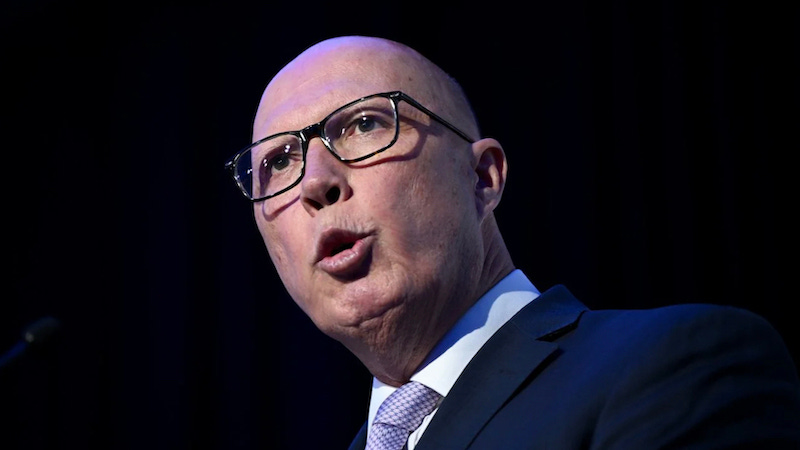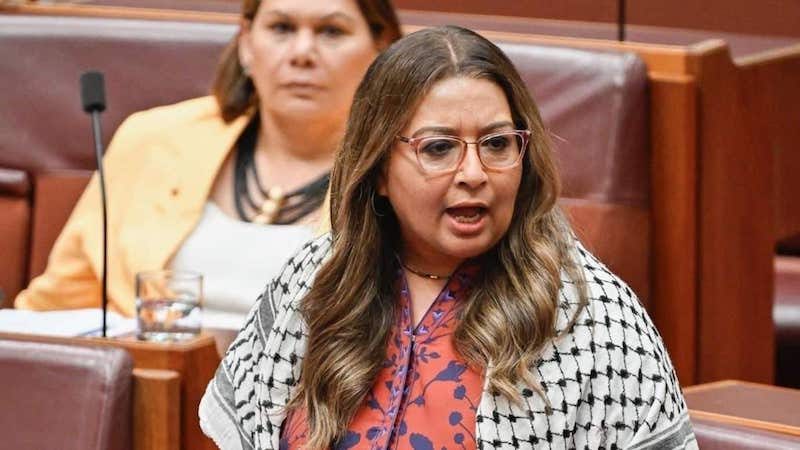Conservative race-baiting politics in the spotlight yet again
It’s critical for the health of Australian democracy that racism be called out and these challenges are met with courage and a relentless pursuit of equality.
The accusations of racism levelled against the Leader of the Opposition, Peter Dutton, and by extension the Liberal Party, highlight a complex and contentious aspect of contemporary political debate. Central to this controversy is the accusation made by the independent member for Warringah, Zali Steggall, who accused Dutton of racism on Sky News – in Parliament, where speech is protected, such accusations are safe from legal reprisal; outside Parliament, however, the stakes are much higher.
Instead of reflecting on his behaviour – unlikely, given his entire political career has been based on attacking people who are not stock-standard white bread material – Dutton’s response to Steggall’s accusations was to consider legal action. His history as Immigration Minister provides substantial material evidence to support claims of racist behaviour: his comments on “African gang violence” in 2018 and the need for migrants to integrate into Australian society, singled out and negatively stereotyped black African communities. This is contrasted by his supportive comments and completely different tone towards white South African farmers, whom he described as hard-working and well-integrated into Australian society, and he would “always look at ways” for the then Coalition government to fast-track visa applications, an act which would have been against Australia’s non-discriminatory migration policy.
This split in Dutton’s statements raises critical questions about racial bias in his policymaking and public rhetoric. The selective compassion evident in his differential treatment of migrants – perceiving white South Africans as desirable while casting aspersions on the character and behaviour of black African migrants – feeds into the narrative of racial bias.
There are other examples: Dutton’s actions towards the Murugappan family – denying medical care to their Australian-born children – and his policies on asylum seekers, further compromise his public image. His approach to immigration detention; his walkout protest during the Stolen Generation speech in 2008, and his stance on the Voice of Parliament in 2023, all suggest a pattern that aligns with a broader, racially insensitive and racist agenda.
Legalities aside, the essence of racism in politics often boils down to both the impact and the intent behind words and actions. Dutton’s policies and statements suggests a worldview that implicitly, and explicitly, differentiates between races in ways that disadvantages non-white Australians.
Actions speak louder than words in assessing Dutton’s behaviour. If racism, as commonly understood, involves prejudice, discrimination, or antagonism directed against other people because of their race or ethnic origin, then the evidence presented in public life suggests there is a significant cause for such claims to be made against him.
The ethics of banning people fleeing a war zone
A recent focal point for Dutton was his stance on visa applications for Palestinian refugees from Gaza, where he declared a complete prohibition on entries from Gaza, which then raised ethical and policy-oriented questions about the treatment of individuals fleeing conflict zones: this is the purpose of Australia’s humanitarian visa program but Dutton was only too happy to play the race card and seek favour from the right-wing Israel lobby at the same time. It’s also a moot point: Israel controls who can leave the occupied Palestinian territories through Israeli-issued exit permits and, since May, no one has been allowed out of Gaza anyway.
This policy stance taken by Dutton, however, does not operate in isolation but rather reflects a broader narrative within the Liberal Party, characterised by an overt appeal to xenophobic sentiments. The manner in which this policy was communicated suggests an aggressive, public doubling down on divisive racial rhetoric, an approach which serves to not only polarise the community but also to court a specific segment of the electorate known for its highly conservative views on immigration and race.
The strategic implications of such a stance are complicated. On one hand, it solidifies the Liberal Party’s appeal among voters who prioritise stringent immigration controls or who harbour suspicious views about Middle Eastern conflicts and the impact they might have in Australia. On the other hand, it alienates broader sections of the electorate, including moderate conservatives and centrists, who view such policies as unnecessarily harsh or morally questionable.
The scrutiny of Dutton’s policies and actions, especially those that are racially charged or unjustly discriminatory, highlights the role that civic institutions can play in questioning and holding leaders accountable. However, the discussion needs to move beyond the semantics of political correctness and engage with deeper, more systemic issues of racism and intolerance within political leadership – in Dutton’s case, he seemed to be more offended by the label of “racist” than by his actual racist commentary, and this points to a troubling disconnect between perception and reality in public discourse.
In this context, the role of media scrutiny becomes even more critical, where they should not only be reporting on these issues but also interpreting and contextualising them for the public, areas where they have so far been lacking. This is an essential issue, not just for informing the electorate but also for guarding the integrity of democratic institutions against the corrosive effects of the division that are usually created by conservative politicians.
Duttonistan: Queensland’s distinct political landscape
The distinct political culture in Queensland – shaped by historical figures such as Joe Bjelke-Petersen in the 1970s and 1980s and the long-standing influence of the National Party – has created a stronghold for the now merged Liberal–National Party at the federal level, despite mixed success in Queensland state elections.
This entrenched conservatism in Queensland is often characterised by a unique blend of social and economic policies, and Dutton, as a product of this Queensland political environment, embodies these conservative ideals, which have consistently secured his electoral success in the seat of Dickson since 2001, when he was first elected to Parliament.
The approach taken by Dutton and the Queensland L–NP – which relies on stoking fears about immigration and leveraging racially charged rhetoric – has proven electorally successful in Queensland but faces significant challenges elsewhere. This style of politics, while resonating within certain demographics in Queensland, does not translate well across the broader Australian electorate, which tends to be more diverse and, particularly those with urban centres such as Sydney and Melbourne, more progressive and moderate views usually prevail – often but not always.
The disparity in electoral success between state and federal levels in Queensland complicates the L–NP’s strategy. While the party has maintained significant control federally – consistently holding between 20 and 25 of the 30 federal seats over the past 30 years – their state-level performance has been less impressive, where they have only been in office for five years since 1989, highlighting a disconnect between the regional conservative base and the broader state electorate’s preferences.
This dichotomy also poses a strategic dilemma for the L–NP: should they continue with a proven but potentially limiting conservative approach, or should they adapt to a changing political environment that may favour more moderate or centrist policies? In any case, a shift to a more centrist position would not be a task for Dutton: moderation is not one of his political tools, and if such an unlikely shift were to occur, it would be viewed with great skepticism by the electorate.
While the L–NP faces organisational and credibility challenges across Australia – despite a landslide victory for the Country Liberal Party in the Northern Territory election on the weekend – internal divisions between moderates and conservatives are exacerbating the party’s difficulties. These challenges are not isolated to the L–NP but reflect a broader trend in Australian politics where traditional party structures and strategies are being slowly dissolving, and new political movements and independents are gaining traction, as evidenced in the 2022 federal election and a slow decline in the two-party primary vote since 1984.
The political future for Dutton and the L–NP hinges on their ability to navigate these dynamics and balancing the conservative base’s demands with the broader electorate’s evolving preferences. This balancing act is crucial not only for electoral success – as it is for all political parties – but also for maintaining relevance in an increasingly diverse and fluid political landscape.
Unmasking the racism of Australian Parliament
Senator Mehreen Faruqi: This week, this place has broken me with its racism, with its attacks on Muslims, on Palestinian refugees, on disabled people and on women. Those who are not piling on hate and racism are standing on the sidelines or gaslighting, or worse, trying to shut us up, because that’s what you want: You want us to be silenced because you don’t like us holding a mirror to you. You don’t like the truth you see in the mirror because you can’t handle that truth. The roots of the racism in this country and the problems in this country sit right here in this Parliament.
Of course, in a week that was dominated by a debate over whether Dutton’s actions and behaviours are racist or not, the forgotten world of everyone else on the margins continued to clean up and deal with the effects of collateral damage.
The sentiments expressed by Senator Faruqi highlights a critical and disheartening aspect of contemporary political debate in Australia – the pervasive and systemic nature of racism within the highest echelons of political power, and the emotional and professional toll it places on individuals who are often its targets.
The roots of racism in Australia are certainly entrenched in the structures of power and governance, exemplified by the ongoing debates and policies that emerge from Parliament, which reveal a significant divide in understanding and addressing racial issues within the governing bodies. The role of parliamentarians is not only to reflect the views – and prejudices – of their constituents but to challenge and reshape them towards a more inclusive and equitable society: Parliament should strive to be more than a mirror reflecting societal attitudes – it needs to be an institution for reform and progress. It is not enough for members of Parliament to passively reject racism; they must actively confront and dismantle the structures and practices that allow it to thrive.
When leaders like Dutton engage in racially charged rhetoric or support divisive policies, it not only impacts the immediate political landscape but also confirms and supports existing societal norms and behaviours, perpetuating cycles of racism and exclusion. This is the part that needs to change and it’s depressing that this constantly needs to be pointed out to conservative politicians. There needs to be a systemic overhaul of how issues of race are addressed within legislative processes and this requires a commitment to transparency, accountability, and inclusivity in policy formulation.
It’s critical for the health of the Australian democracy and the integrity of its institutions that these challenges are met with courage and a relentless pursuit of equality. Parliament, as both a symbol and a mechanism of governance, has a central role in leading this change, ensuring that the principles of justice and equity are not just upheld but cherished.













"The role of parliamentarians is not only to reflect the views – and prejudices – of their constituents but to challenge and reshape them towards a more inclusive and equitable society: Parliament should strive to be more than a mirror reflecting societal attitudes – it needs to be an institution for reform and progress. It is not enough for members of Parliament to passively reject racism; they must actively confront and dismantle the structures and practices that allow it to thrive."
THIS!!!
I never accepted this whole "you must say what your constituents want you to say". Let's face it, most constituents are either racist, xenophobic or just don't know jack about anything.
The government should be a moral LEADER, not follower. It should strive to improve the people, not pander to them:)